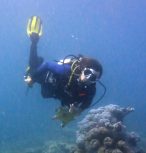DNA reveals the past and future of coral reefs
New DNA techniques are being used to understand how coral reacted to the end of the last ice age in order to better predict how they will cope with current changes to the climate. James Cook Univer

From 2005 to 2022, the main node of the ARC Centre of Excellence for Coral Reef Studies was headquartered at James Cook University in Townsville, Queensland (Australia)








Abstract: Coral reefs around the world are profoundly threatened by human impacts but the extinction risk faced by individual coral species is less clear-cut. The most transparent and defensible estimates of species’ extinction risk are based on quantitative population viability analyses (PVA; IUCN Red List Criterion E). However, the current Red List of coral species is based primarily on expert opinion, since coral demographic datasets are scarce, and are taxonomically- and geographically- biased towards well-studied species and regions. My thesis will create quantitative methods that will place the coral Red List on a strong quantitative foundation, by tailoring classical PVA metrics such as census and effective population sizes to the unique demographics of highly dispersive, clonal corals. I will then apply these tools to re-assess the extinction risk of a large subset of coral species. To expand these tools to more data-deficient coral species, my thesis will also investigate demographic identifiers of coral life history strategies, and whether easy-to-measure “soft” traits such as skeletal density or polyp size can serve as proxies for harder-to-measure vital rates.
Biography: Andreas is a PhD candidate at James Cook University investigating means to advance our quantitative understanding of extinction risk in corals under the supervision of Professors Terry Hughes, Dr. Michael Bode and Professor Sean Connolly. He holds a Bachelor of Science in Ecology from Goettingen University, Germany, and a Master of Science in Environmental Science from Utrecht University, the Netherlands.
New DNA techniques are being used to understand how coral reacted to the end of the last ice age in order to better predict how they will cope with current changes to the climate. James Cook Univer
A new study on the effects of climate change in five tropical countries has found fisheries are in more trouble than agriculture, and poor people are in the most danger. Distinguished Profess
James Cook University researchers have found brightly coloured fish are becoming increasingly rare as coral declines, with the phenomenon likely to get worse in the future. Christopher Hemingson, a
Researchers working with stakeholders in the Great Barrier Reef region have come up with ideas on how groups responsible for looking after the reef can operate more effectively when the next bleaching
Abstract: As marine species adapt to climate change, their heat tolerance will likely be under strong selection. Individual variation in heat tolerance and its heritability underpin the potential fo
Abstract: The Reef Ecology Lab in KAUST’s Red Sea Research Center explores many aspects of movement ecology of marine organisms, ranging from adult migrations to intergenerational larval dispersal
Abstract: Macroalgal meadows are a prominent, yet often maligned component of the tropical seascape. Our work at Ningaloo reef in WA demonstrate that canopy forming macroalgae provide habitat for ad
Abstract: Sharks are generally perceived as strong and fearsome animals. With fossils dating back at least 420 million years, sharks are not only majestic top predators but they also outlived dinosa
Abstract: Connectivity plays a vital role in many ecosystems through its effects on fundamental ecological and evolutionary processes. Its consequences for populations and metapopulations have been
Abstract: Evolution of many eukaryotic organisms is affected by interactions with microbes. Microbial symbioses can ultimately reflect host’s diet, habitat range, and even body shape. However, how
Abstract: The past few years have seen unprecedented coral bleaching and mortality on the Great Barrier Reef (GBR) but the consequences of this on biodiversity are not yet known. This talk will expl